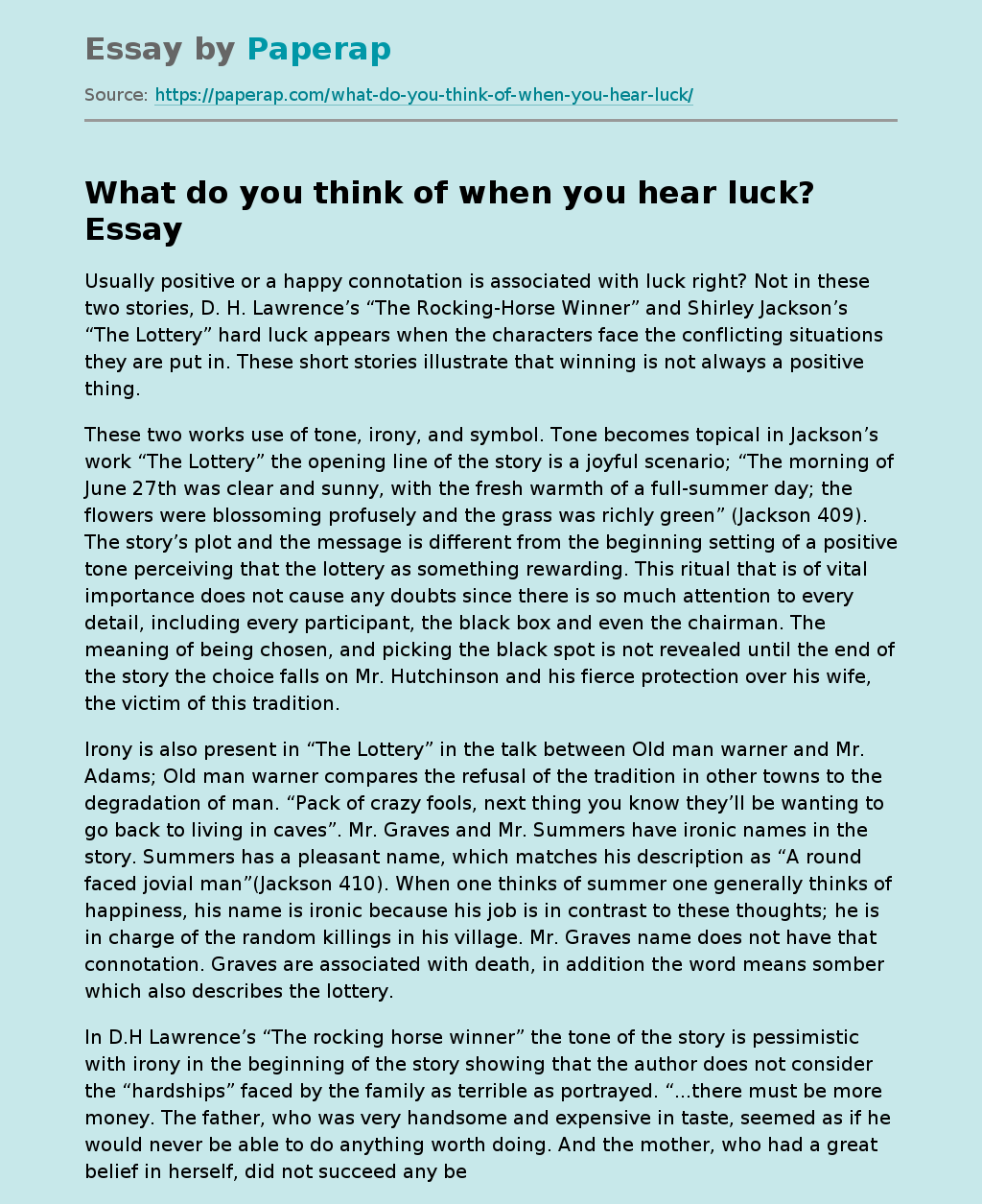Usually positive or a happy connotation is associated with luck right? Not in these two stories, D. H. Lawrence’s “The Rocking-Horse Winner” and Shirley Jackson’s “The Lottery” hard luck appears when the characters face the conflicting situations they are put in. These short stories illustrate that winning is not always a positive thing.
These two works use of tone, irony, and symbol. Tone becomes topical in Jackson’s work “The Lottery” the opening line of the story is a joyful scenario; “The morning of June 27th was clear and sunny, with the fresh warmth of a full-summer day; the flowers were blossoming profusely and the grass was richly green” (Jackson 409).
The story’s plot and the message is different from the beginning setting of a positive tone perceiving that the lottery as something rewarding. This ritual that is of vital importance does not cause any doubts since there is so much attention to every detail, including every participant, the black box and even the chairman.
The meaning of being chosen, and picking the black spot is not revealed until the end of the story the choice falls on Mr. Hutchinson and his fierce protection over his wife, the victim of this tradition.
Irony is also present in “The Lottery” in the talk between Old man warner and Mr. Adams; Old man warner compares the refusal of the tradition in other towns to the degradation of man. “Pack of crazy fools, next thing you know they’ll be wanting to go back to living in caves”.
Mr. Graves and Mr. Summers have ironic names in the story. Summers has a pleasant name, which matches his description as “A round faced jovial man”(Jackson 410). When one thinks of summer one generally thinks of happiness, his name is ironic because his job is in contrast to these thoughts; he is in charge of the random killings in his village. Mr. Graves name does not have that connotation. Graves are associated with death, in addition the word means somber which also describes the lottery.
In D.H Lawrence’s “The rocking horse winner” the tone of the story is pessimistic with irony in the beginning of the story showing that the author does not consider the “hardships” faced by the family as terrible as portrayed. “…there must be more money. The father, who was very handsome and expensive in taste, seemed as if he would never be able to do anything worth doing. And the mother, who had a great belief in herself, did not succeed any better and her taste were just as expensive” (Lawrence 101). People who cannot find any money but can afford expensive taste, while the call themselves “poor members of the family”(lawrence 101).
They buy expensive toys for their children and use a taxi service but remain poor because they aren’t living up to their wishes. The talk with the mother and paul is also ironic and contains some symbolism about luck. Their family ties in luck with having money; there is a misperception between of luck compared directly to money and Paul dies young and rich, which isn’t luck at all. Similarly to the family “not having money” the whispers in the house get louder rather quite down after Paul gives his mom money for her birthday, and they represent greed. The woman appears to love her children, and everyone says she’s a good mother but “her heart as a hard little place that could not feel love, no not for anybody”(Lawrence 100).
There are many symbols that are in the rocking horse, the rocking horse itself represents childhood, rocking back and forth represents the need for his mother’s love which might be the destination he is trying to get to. Paul’s closed set eyes means he’s focused on trying to be “lucky”
In summary, D. H. Lawrence’s “The Rocking-Horse Winner” and Shirley Jackson’s “The Lottery” have many themes, symbols, and tones in common. The use of irony in these short stories is to convey a message in the story opposite of what the author means. And if we are not aware of their existence we will not perceive the writer’s ironic moments. In both short stories the irony is used in a dark, gloomy tone to throw off the message in the story. In The rocking horse, there were many uses of irony including the mother seeming like she loved her children in reality she could not love anyone, and bought them expensive toys to buy their love. Also in the lottery, the irony in this short story was the multiple names like Mr.Summers who was responsible for the stonings in the village.
What do you think of when you hear luck?. (2021, Dec 03). Retrieved from https://paperap.com/what-do-you-think-of-when-you-hear-luck/

